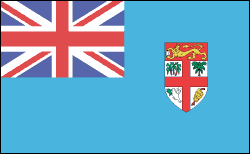Fiji History


Prime Minister Is Deposed in Attempted Coup
Continuing ethnic tensions, partly fueled by economic problems, plunged Fiji into a national nightmare in 2000. On May 19, a group of armed soldiers entered Parliament and took three dozen people hostage, including Prime Minister Chaudhry. George Speight, a part-Fijian businessman, led the insurrection, and he demanded that the 1998 constitution be rewritten to allow dominance of ethnic Fijians. The standoff lasted two months. In July 2000, Speight and other coup leaders were taken into custody and charged with treason. In Feb. 2002, Speight was sentenced to death, but his sentence was commuted.
Although the coup was foiled, deposed prime minister Chaudhry and his democratically elected government were not restored to power. Instead, the military and the Great Council of Chiefs, a group of 50 traditional Fijian leaders, appointed an interim government dominated by ethnic Fijians. Elections were held in 2001, but no party achieved a majority. Interim prime minister Laisenia Qarase's Fijian United Party won 31 of 71 seats, and Qarase was sworn in as prime minister in September. His cabinet consisted entirely of ethnic Fijians, but the supreme court declared Qarase's government unconstitutional in 2003. In 2004, political infighting stalled the implementation of a new multiethnic cabinet. Much to Prime Minister Qarase's displeasure, Vice President Ratu Jope Seniloli and four other prominent figures were convicted for their part in the 2000 coup and imprisoned in Aug. 2004. In 2005, Qarase backed a highly controversial bill that included an amnesty clause for the 2000 coup leaders. The bill was supported by the Great Council of Chiefs and the ethnic Fijian establishment but vehemently rejected by the opposition (led by former prime minister Chaudhry, who was deposed in the coup) as well as the military. Qarase was narrowly reelected in May 2006 for another five-year term.







